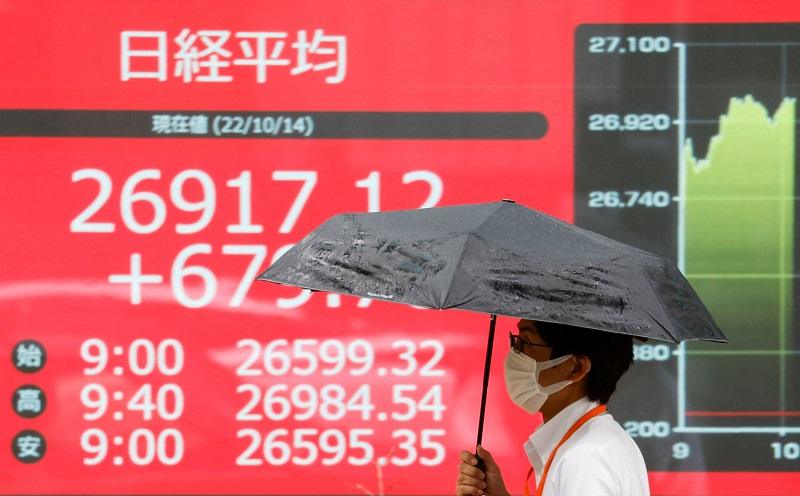Asian shares track Wall Street higher as jitters abound

A man walks past in front of an electric monitor displaying the Japanese Nikkei share average in Tokyo, Japan October 14
13:53 JST, October 14, 2022
SYDNEY (Reuters) – Asian shares tracked Wall Street higher on Friday, although gains could quickly unwind as investors grapple with the reality that surging U.S. inflation will likely lead to higher interest rates for longer, hastening a global recession.
MSCI’s broadest index of Asia-Pacific shares outside Japan .MIAPJ0000PUS rose 1.6% in early Asia trade. Australia’s resources-heavy share index .AXJO gained 1.6%, South Korea .KS11 advanced 2.1%, while Japan’s Nikkei .N225 jumped 2.8%.
Chinese bluechips .CSI300 also opened 0.8% higher, as the central bank chief promised stronger support to the real economy as COVID lockdowns spread ahead of the all-important Communist Party Congress. Read full story
Investors had sold off shares earlier in the week in anticipation of a strong U.S. inflation print, with the Asian index now paring weekly losses to 3.4% for the week, helped by the bounce on Friday.
Offshore, risk appetite is already softening, with U.S. S&P 500 futures ESc1 sliding 0.1% while the Nasdaq futures NQc1 falling 0.2%.
U.S. data overnight showed core inflation – which excludes food and fuel prices – came in above forecasts at 6.6%, the biggest annual increase in 40 years, driven by large price gains in the services sector.
Wall Street had a volatile session, after initial sell-off on the data proved short-lived with technical support and short-position covering helping stocks stage a strong rebound.
The Dow Jones Industrial Average .DJI rose 2.83%, the S&P 500 .SPX gained 2.60% and the Nasdaq Composite .IXIC added 2.23%.
“Equity investors seemingly decided that a stronger U.S. inflation still doesn’t negate expectations of sharp declines in prices ahead,” said Rodrigo Catril, senior FX strategist at NAB.
“That might be true, but there is still a great deal of uncertainty of how quickly this decline will unfold and for the Fed this decline needs to be significant. A fall from 6% to 4% won’t be enough. The Fed wants assurances that core CPI will head down to 2% and we are still a long way from that goal.”
Short-term movements aside, the surprisingly strong U.S. inflation data have led the markets to fully price in a 75 basis point hike from the Fed at its November meeting and even another jumbo rate hike of 75 bp in December, with a 71.5% probability.
Futures 0#FF: have also suggested that rates would now peak at 5%, bringing them to levels not seen since 2007.
On Friday, the gap between the 2-year and 10-year Treasury yields was mostly inverted, with the spread standing at a minus 51 bp.
The inverted yield curve is usually treated as a harbinger of recession.
The aggressive tightening from the Fed is putting pressure on central banks around the globe to follow. Singapore’s central bank on Friday tightened monetary policy for the fourth time this year and warned more would be needed to tame inflation. Read full story
The Singapore dollar SGD=D3 jumped about 0.5%.
Global markets have been extremely volatile recently as investors have worried that major economies will be pushed firmly into recessions before inflation is tamed, while a strong dollar as the Fed tightens aggressively would wreak havoc in emerging markets.
The dollar =USD, which eased 0.6% on Thursday as stocks rebounded, was little changed against a basket of major currencies in early Asia.
The Japanese yen JPY=, on the other hand, touched a 32-year low of 147.67 per dollar overnight before stabilizing around 147.3 on Friday. That is below the level Japanese authorities intervened last month to prop up the yen, which they did when it weakened past 145.9 to the dollar.
Bank of Japan Governor Haruhiko Kuroda on Thursday reaffirmed its ultra-loose monetary policy, which has weighed on the yen, saying that raising interest rates now was inappropriate in light of the country’s economic and price conditions. Read full story
Investors are also nervously awaiting an impending deadline for the end of the Bank of England’s emergency bond-buying program on Friday.
British government bonds have outperformed lately, with prices rising strongly on Thursday after reports that the government was considering a U-turn on some of the measures in its late-September “mini-budget” that triggered a historic gilts slump and concerns about financial stability.
Sources familiar with the matter told Reuters that finance minister Kwasi Kwarteng is cutting short a trip to Washington to return to London so he can continue work on the fiscal plan. Read full story
Oil prices fell in early Asian trade. Brent crude LCOc1 futures were down 0.4% at $94.21 a barrel while U.S. West Texas Intermediate (WTI) crude CLc1 futures fell by similar margin to $88.81 per barrel. O/R
"News Services" POPULAR ARTICLE
JN ACCESS RANKING




